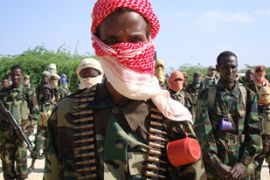AU to send more troops to Somalia
Guinea and Djibouti pledge troops to peacekeeping force, despite al-Shabab threats.

It said that the attacks were in response to the deaths of Somali civilians at the hands of AU peacekeepers.
The group, which the US says is allied to al-Qaeda, has warned of further violence in Uganda and Burundi unless they pull their troops out of Somalia.
‘Full commitment’
If Guinea and Djibouti fulfill their pledges, it will provide a major boost to the 6,000 soldiers from Uganda and Burundi.
“Guinea is preparing a battalion to be sent to Somalia immediately,” Jean Ping, the AU’s commission chairman, told reporters in Kampala ahead of the summit which begins on Sunday.
“Djibouti prepared a battalion six months ago. Guinea’s commanders are in Mogadishu preparing for the arrival of their troops.
| IN DEPTH | |||||||||||||
|
“We have today a full commitment with Guinea for a battalion. Guinea is ready to immediately send troops.”
Abdurahman Adnan Ibrahim, deputy prime minister of Somalia’s transitional government, welcomed the troops and said the government was expecting more from the AU.
“The AU is now doing what we have been telling them for a long time that this [al-Shabab] is not only an enemy for Somalia but is the enemy of the whole region … Every country now realises the reality on the ground,” he told Al Jazeera.
But Nuradine Dirie, a Horn of Africa analyst, said the announcement to deploy more troops “is not significant”.
“African countries have been pledging troops since the conflict started three years ago and they haven’t been able to release the required number of troops,” he told Al Jazeera.
“I think the African peace mission in Somalia is not the answer to problems of Somalia … African countries do not have the resources nor the plans nor experience to carry out counterinsurgency in a country the size of Iraq.”
Army officers from Ghana, Nigeria, Senegal and Zambia were visiting Somalia on Friday as they also considered contributing to the AU peacekeeping force.
East African regional bloc IGAD last month pledged to send some 2,000 troops, but it has not yet announced which countries will contribute peacekeepers.
AU diplomats told the Reuters news agency that its peacekeepers’ mandate would be reviewed at the Kampala summit and it was likely the 8,000-strong cap on troop numbers for the force would be lifted.
‘Collective approach’
Lieutenant-Colonel Felix Kulayigye, the spokesman for the Ugandan army, told Al Jazeera that following the Kampala attacks, the summit should increase the number of troops in Somalia and make adjustments to the mission’s mandate so that AU troops can go after Al Shabab.
|
“Definitely if al-Shabab attacked us…we have no option but to go for them. That is our principle. If you attack us, we will bring the war to you” Lieutenant-Colonel Felix Kulayigye, spokesman, Ugandan army |
“I hope very strongly that the summit that is going to take place here is going to rexamine that mandate, in liason with the UN peacekeeping department, so that we look at the aspect of ridding Somalia of these terrorists rather than allowing them to build capacity so eventually they attack any other target in future,” he said.
He added that if Uganda did not receive the support it was expecting from the AU, it would have “no option” but to act unilaterally.
“Definitely if al-Shabab attacked us, which we are now confirming over time, we have no option but to go for them. That is our principle. If you attack us, we will bring the war to you,” he said.
Al Jazeera’s Andrew Simmons, reporting from Kampala, said that a more aggressive approach towards al-Shabab was likely to be adopted at the summit.
“There is definitely going to be an offensive message from this summit, definitely an increase in troops and possibly a change in mandate,” he said.
“The question is whether this is going to bring Somalia back to some sort of peace after two decades of mayhem.”
Al-Shabab, along with a number of other anti-government groups, controls much of southern and central, as well as most of Mogadishu.
The transitional government, which has long promised to launch a major offensive against al-Shabab, controls only a few streets of the capital.
At least 21,000 civilians are believed to have been killed in the violence over the past years, while 1.5 million have been forced to flee their homes.
